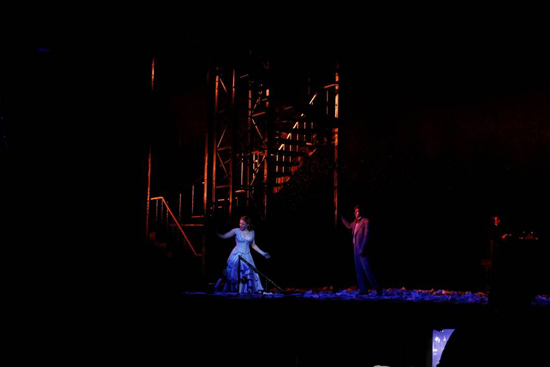Passionate, Surreal Hedda Gabler at BU Theatre
Amplifying primal pulse of Ibsen’s masterpiece

Director Ellie Heyman’s Hedda Gabler has had a remarkable gestation. This impressionistic staging of the classic masterpiece has been both a labor of love and a three-year obsession for Heyman (CFA’11). The College of Fine Arts current production of the Henrik Ibsen play is the first MFA thesis project to be performed on the BU Theatre mainstage.
The seed of Heyman’s Hedda was a 10-minute abstracted version of the play’s essence. A full workshop production followed, and that matured into the play’s current staging, in which the restless, driven heroine weaves her tangled web in a dreamlike world with dynamic lighting and a set likely to make audiences see the Norwegian playwright’s masterpiece in a new, invigorating way.
“I got really interested in this play when I found a very primal pulse to it,” says the upbeat, bright-eyed Heyman, who has imbued her company of actors and designers with a family feeling. She describes the production as “the exploded-out version” of the play, which debuted in 1890, about a “woman who needs out.” Ibsen’s brilliant, impulsive Hedda, starved for beauty and shackled by her bourgeois surroundings, has been Heyman’s constant companion for the past few years. While many directors have demonized her—she does, after all, manipulate and hurt those around her—to Heyman, Hedda is sympathetic and deeply human, a gifted woman in a gilded cage, seeking beauty, romance, and “something transcendent.”
Set in Oslo in the late 1880s, the play follows Hedda, raised in luxury, from her honeymoon with the gentle and ineffectual scholar Jorgen Tesman, to her claustrophobic existence as a middle-class matron. Although she is terrified of scandal, a misguided longing for passion and meaning in her life has Hedda wreaking mischief with her childhood friend Thea Elvsted and the man she loves, the tormented genius and gifted writer Ejlert Lovborg, with whom Hedda once had a tumultuous affair. Hedda’s complex, aching jealousy and frustration with her bland existence set in motion events that end tragically for Lovborg and for Hedda herself.
“Ellie has a strong history of work on this play, beginning with a bold experiment in creating a 10-minute abstracted version,” says Jim Petosa, director of the CFA School of Theatre. “The promise of that production, which explored the Ibsen text with the expressionistic verve of a Strindberg nightmare, convinced us the idea warranted further exploration as a thesis production.”
The play, which runs from May 6 to 13, resonates with modern audiences because its themes are deeply human, says cast member Naomi Lindh (CFA’11), who’s in the “shadow ensemble.” Hedda Gabler is “relevant in the way Shakespeare is relevant,” she says. And Hampton Fluker (CFA’13), who plays Lovborg, relates to Hedda’s yearning for adventure. “I’m from the South, where people want to break out, but they can’t,” says Fluker, who believes Hedda “is not just a Victorian-era play. It’s a commentary on 2011.”
 Hedda is played by Alex Highsmith (CFA’11), who has been part of Heyman’s company as the play has evolved, and she has developed a deep affection for her character. “From Hedda’s perspective, she’s surrounded by dull, lifeless idiots,” Highsmith says. Hedda can basically be “a bitch” in some eyes, but “a lot of this play comes out of love.” Lily Narbonne (CFA’11), who portrays Thea Elvsted, notes the powerful role of class in the play, which “heightens the stakes” between Hedda and Thea.
Hedda is played by Alex Highsmith (CFA’11), who has been part of Heyman’s company as the play has evolved, and she has developed a deep affection for her character. “From Hedda’s perspective, she’s surrounded by dull, lifeless idiots,” Highsmith says. Hedda can basically be “a bitch” in some eyes, but “a lot of this play comes out of love.” Lily Narbonne (CFA’11), who portrays Thea Elvsted, notes the powerful role of class in the play, which “heightens the stakes” between Hedda and Thea.
In addition to her interpretation of Hedda Gabler, Heyman has a long list of directing credits. With Big Theater, the company she cofounded, she has directed Dead Letters: An Exploration of Uncle Vanya and The Bar Show, a neo-burlesque that toured bars in Chicago. At BU, she has directed Miss Julie, In the Summer House, Spring Storm, Steve Martin’s The Underpants, and diventare, which was designed by Hedda Gabler scenic designer Caitlin Fergus (CFA’11).
“We’re all here to tell a story we believe in,” says Heyman.
Hedda Gabler runs from May 6 to 13 at the Boston University Theatre, 264 Huntington Ave., Boston. More information can be found here. Purchase tickets here or call 617-933-8600. Free student tickets, one per BU ID, are available at the door on the day of performance, subject to availability.
Susan Seligson can be reached at sueselig@bu.edu.
Comments & Discussion
Boston University moderates comments to facilitate an informed, substantive, civil conversation. Abusive, profane, self-promotional, misleading, incoherent or off-topic comments will be rejected. Moderators are staffed during regular business hours (EST) and can only accept comments written in English. Statistics or facts must include a citation or a link to the citation.